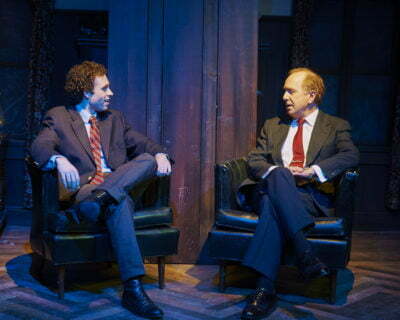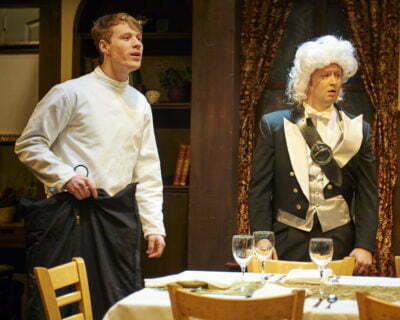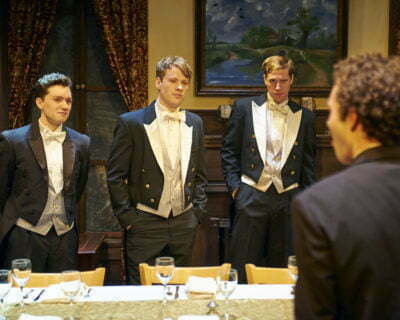Posh
 By Laura Wade
By Laura Wade
Directed by Jonathan Berry
Produced by Steep Theatre Company, Chicago
Up Close and Personal With the Young, Rich, and Angry
In case you haven’t heard, it’s a scary world out there for young people just starting out. Lauren Wade’s 2010 drama Posh, the latest of many contemporary plays from the British Isles to make its American premiere at Steep’s Edgewater blackbox, shows that even the most privileged youth with the most pre-determined paths through life are feeling anxious. Them, perhaps, the most of all. Under the sure direction of Jonathan Berry, a brilliant ensemble cast makes up the Riot Club, a fictionalized version of a notorious Oxford fraternity that has boasted some of the most powerful British figures of the past or present. Alternatingly charming, appalling, and downright infuriating, this group of young men fret over a position in society they fear will slip from their fingers before they’ve even had an opportunity to wield power, unless they can reassert themselves quickly. The result is a gripping character-drama at extremely close quarters.

The play takes place at the time it was written, shortly after David Cameron led the Conservative Party to victory, ending thirteen years of Labour rule. Cameron is a descendent of King William IV, and his rise, along with that of London Mayor Boris Johnson and Chancellor of the Exchequer George Osborne (all members of the real-life Bullingdon club), provided the ancient British establishment with a bit of breathing room after decades of sliding into irrelevance. The first member of the Riot Club we see, Guy Bellingfield (Sean Wiberg), is nervously fidgeting with his tie while meeting with his powerful godfather, Jeremy (Will Kinnear), and is a bit too quick to gulp down the whisky the old peer offers. The Riot Club has only recently been allowed to re-convene after a year’s suspension, and Jeremy warns Guy not to attract any more negative attention. Guy had been hoping to put himself into a strong position for becoming president of the club, thinking it will improve his prospects. Jeremy is a bit alarmed at that, since it’s not the sort of position which endears one to the general public, but Guy reassures him that he only means he expects to improve his standing among the people who actually matter. Jeremy agrees that doing something really outstanding with the menu at the club’s next dinner would make a good impression.

Over the centuries, the Riot Club developed a habit of ritually destroying the venue hosting their dinners, and to clear their consciences and further demonstrate their power, issuing a blank check afterward to the landlord. Their ban was due to one loose-lipped member’s bragging about this practice ending up on YouTube. That member, Toby Maitland (Christopher Borek), knows he’s still in trouble as the fraternity brothers begin arriving at the location of tonight’s dinner, an inn and pub suitably located outside a fifteen-mile radius of Oxford and reserved under a fake name. It is quickly apparent that there is a divide among the ten members over whether they should actually attempt to improve their behavior. Guy and the incumbent president, James Leighton-Masters (Japhet Balaban), would prefer to have fun without anything getting broken, but other members feel that this would be compromising on principle. You can’t claim a hereditary title unless you really believe in a natural blood-based hierarchy, the thinking goes, and if that’s the case, they have nothing to apologize for. Once the bourgeois proprietor accepts a bribe for indulging a small amount of disruptive and illegal behavior, attempts to defend his business and his and his daughter’s safety based on his claimed ethics system become much harder for the more moderate aristocrats to maintain.

Wade’s writing in Posh is masterful. Although there’s very little plot for these two and a half hours, the characters are so fully drawn that their interactions are always fascinating. Wade’s craftiness is such that she does not provide a great deal of backstory for any of them either—one’s Greek, one’s gay, two are initiates, James is the president—but we understand precisely each of their personalities. It goes deeper than that Ed Montgomery (Michael Kurowski) constantly makes faux pas in attempts to sound impressive, that Harry Villiers (Dash Barber) possesses unbridled energy which translates into insatiable lust and athletic competition, or that Alistair Ryle (Michael Holding) possesses a violent hatred for commoners because he perceives they feel the same toward him. These characters know each other well, and are united by a belief that they are unappreciated and unfairly maligned, but do not all feel genuine affection for every single other person at the table. Of course, a great deal of credit for this should also go to the actors. Wade wrote people, not villainous cartoons, and they’re often funny and likable during lighter moments. Several other actors also put in strong supporting performances, including Alex Gillmor as the money-grubbing, moralizing landlord who vindicates the aristocrats’ opinions of the middle-class, Bryce Gangel as his daughter, who refuses to take them seriously enough to be intimidated by them, and Kendra Thulin as a prostitute who is a stickler for regulations in a brief, but memorably hilarious sequence.

Sticking a fourteen-person cast into a small theatre is also a reliable way to heighten a play’s theatricality. People sitting in the first row are usually only inches away from at least one actor, and the inevitable escalation of violence and self-destruction is quite effective. But even before then, the play’s emotions and points are all the more impactful for having a claustrophobic atmosphere (it is against club rules to leave the room of the meal). Despite their feeling that they’ve only just gotten a temporary reprieve from a world that was falling apart around them, the boys are wracked with paralysis, depression, and the self-awareness to be ashamed of their inadequacy. That’s hardly a mind-set that’s unique to the upper class. Matthew Chapman’s sound design, which makes use of dramatic Mozart music for things like the distribution of melba toast, is probably deliberately too much, but also an amusing commentary on the Riot Club’s self-importance. Ashley Ann Woods and Jenny Pinson’s scenic and props designs create a realistic space that blends into the theatre around the edges, which in this thrust staging, are always visible. Posh was written for large proscenium theatres, but in Steep’s production on this side of the Atlantic, we have a place at the table. It’s great theatre, but perhaps not a place you’d want to be at in real life.
Highly Recommended
Jacob Davis
3jacob.davis@gmail.com
Reviewed January 23, 2015
This show has been Jeff recommended.
For more information, see Posh’s page on Theatre in Chicago.
Playing at Steep Theatre Company, 1115 W Berwyn, Chicago. Tickets are $25-35; to order, call 866-811-4111 or visit steeptheatre.com. Performances are Thursdays-Saturdays at 8:00 pm and Sundays at 3:00 pm through March 12. Running time is two hours and thirty minutes, with one intermission.
